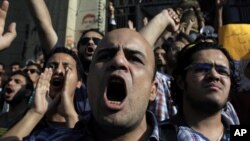An international human rights group has accused Egypt's military of beating and torturing protesters arrested during a huge rally near the Defense Ministry in Cairo earlier this month.
The New York-based Human Rights Watch said Saturday soldiers fired tear gas and water cannon at thousands of demonstrators demanding an immediate end to military rule and arrested some 350 people as part of its crackdown on the protests.
Joe Stork, deputy Middle East and North Africa director for the group, said "the brutal beating of both men and women protesters shows that military officers have no sense of limits on what they can do."
The three days of street clashes outside the defense ministry building began on May 2 and came two days after fighting in Cairo left at least 11 people dead and more than 100 others wounded. The violence prompted the top two Islamist candidates for the presidency to suspend their campaigns.
Egypt's presidential elections are scheduled for May 23 - 24.
The military council took over after the ouster of longtime autocratic President Hosni Mubarak in February 2011. The council has promised a democratic transition and transfer of power to an elected president by July 1.
But Egypt's generals have faced strong domestic criticism for their handling of that process, which has been plagued by periodic eruptions of deadly violence, often surrounding anti-government protests in major cities.
The New York-based Human Rights Watch said Saturday soldiers fired tear gas and water cannon at thousands of demonstrators demanding an immediate end to military rule and arrested some 350 people as part of its crackdown on the protests.
Joe Stork, deputy Middle East and North Africa director for the group, said "the brutal beating of both men and women protesters shows that military officers have no sense of limits on what they can do."
The three days of street clashes outside the defense ministry building began on May 2 and came two days after fighting in Cairo left at least 11 people dead and more than 100 others wounded. The violence prompted the top two Islamist candidates for the presidency to suspend their campaigns.
Egypt's presidential elections are scheduled for May 23 - 24.
The military council took over after the ouster of longtime autocratic President Hosni Mubarak in February 2011. The council has promised a democratic transition and transfer of power to an elected president by July 1.
But Egypt's generals have faced strong domestic criticism for their handling of that process, which has been plagued by periodic eruptions of deadly violence, often surrounding anti-government protests in major cities.





